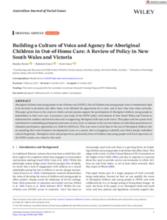Aboriginal children and young people in out-of-home care (OOHC), like all children and young people, have a fundamental right to be involved in decisions that affect them, to be afforded the opportunity for a voice, and to have that voice taken seriously. This paper gives focus to the extent to which current systems support the participation of Aboriginal children young people as stakeholders in their own care. It presents a case study of the OOHC policy environment in New South Wales and Victoria to understand the enablers and barriers that exist in supporting Aboriginal child and youth voices. This paper calls for system-level commitment to embedding participatory processes at every level, in contrast to the current reliance on individual practitioners to champion participatory approaches at a child-by-child level. This is no more crucial than in the care of Aboriginal children who are spending their most formative developmental years in a system that is struggling to identify and reform deeply embedded cultural hegemony. Aboriginal voices and perspectives, particularly those of children and young people with lived experience of the OOHC system, are critical to this work.

